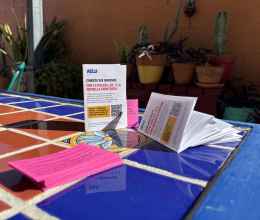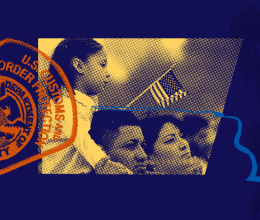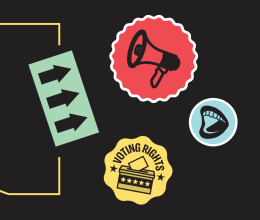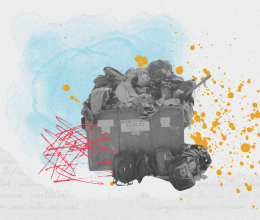
FOR IMMEDIATE RELEASE
CHICAGO, LOS ANGELES, PHOENIX and MIAMI—Widespread abuse of unaccompanied immigrant children at the hands of U.S. border officials spurred a group of civil and human rights organizations to file a complaint today on behalf of more than 100 children, each of whom reported experiencing abuse and mistreatment while in the custody of U.S. Customs and Border Protection (CBP), the border enforcement agency within the U.S. Department of Homeland Security (DHS).
“Border Patrol agents are committing appalling abuses of children all along the border,” said Ashley Huebner, managing attorney of the Immigrant Children’s Protection Project at the National Immigrant Justice Center. “Even worse, Border Patrol has been committing these abuses for years, and our organizations have notified the agency numerous times, yet nothing has changed. The recent increase in arrivals of young people at the border makes it especially urgent that CBP ensure all children in their custody are treated safely and humanely.”
“Border agents operate in a zone of impunity,” said James Lyall of the ACLU Border Litigation Project. “Given CBP’s recent promise to be more accountable and transparent, we call on the agency to finally address these systemic abuses in a serious and meaningful way.”
Today’s administrative complaint with DHS—the department’s only mechanism for seeking redress—was filed by the National Immigrant Justice Center (NIJC), the ACLU Border Litigation Project, Americans for Immigrant Justice (AI Justice), Esperanza Immigrant Rights Project (Esperanza), and the Florence Immigrant and Refugee Rights Project (Florence Project).
Children detained by CBP across the country have reported scores of examples of verbal, sexual and physical abuse; prolonged detention in squalid conditions; and a severe lack of essential necessities such as beds, food and water.
The complaint describes Border Patrol agents denying necessary medical care to children as young as five-months-old, refusing to provide diapers for infants, confiscating and not returning legal documents and personal belongings, making racially-charged insults and death threats, and strip searching and shackling children in three-point restraints during transport. Reports of such abuse have been documented and reported for years, but no reforms have been implemented, nor have any actions been taken to hold agents accountable.
Children referenced in the complaint, many of whom fled violence and persecution in their home countries, include:
- H.R., a seven-year-old boy, was severely developmentally disabled and suffering from acute malnourishment when he was apprehended, but CBP held him in custody for approximately five days without any medical treatment. He was eventually hospitalized and underwent emergency surgery.
- D.G., a 16-year-old girl, was detained with adults. When CBP officials searched D.G., they violently spread her legs and touched her genital area forcefully, making her scream.
- M.R., a 15-year-old girl, traveled from Guatemala with her two-year-old son. Both M.R. and her son became sick while in CBP custody, but M.R.’s requests for medical attention were ignored or dismissed for approximately five days, until she and her son were finally taken to a hospital.
- K.A., a 14-year-old girl, had her asthma medication confiscated by CBP officials and proceeded to suffer multiple asthma attacks in the filthy and overcrowded CBP holding cells. After the first asthma attack, officials threatened that they would punish her if she were faking.
- C.S., a 17-year-old girl, was detained in a hielera (freezer) in wet clothes. Her clothes did not dry for three and a half days due to the frigid temperature in the holding cell. The only drinking water available to C.S. came from the toilet tank, and the bathroom was situated in plain view of all other detainees with a security camera mounted in front of it.
“We have instances where CBP shackled 13- and 14-year-olds, infants became sick while held in cells maintained at freezing temperatures, and many children were held in CBP custody beyond the legal 72-hour period, without food or blankets,” said Erika Pinheiro, directing attorney for community education programs at Esperanza Immigrant Rights Project.
“Children are fleeing untenable conditions in their home countries, including pervasive violence and persecution, and are often re-victimized in transit to the United States,” said Joseph Anderson, director of litigation for Americans for Immigrant Justice. “We need to ensure that these children are treated with dignity and respect and afforded all applicable legal protections while they are in U.S. custody.”
The complaint’s recommendations include:
- Enhanced CBP oversight, including creation of an independent oversight body;
- Binding and enforceable short-term detention standards;
- Creation of a uniform complaint process at DHS that includes confidential, expedited processes by which children can safely report abuse and receive timely recourse;
- Adequate training for all officers who may encounter unaccompanied immigrant children;
- Timely investigation into the complaints of abuse;
- Accountability for any agent who violates the law and/or agency guidelines; and
- Publication of the results of any investigations.
The complaint was filed with the DHS Office for Civil Rights and Civil Liberties as well as the DHS Office of Inspector General. The complaint emphasizes that abuses of unaccompanied children by immigration officials have been documented and reported to DHS for years but the government has not implemented reforms or taken any action to hold agents accountable.





